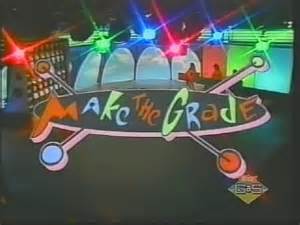The Joker's Wild is an American television game show that has aired at different times since the 1970s. Contestants answer questions based on categories determined randomly by a mechanism resembling a slot machine. The show's title refers to the game's slot-machine mechanism also having jokers.

Make the Grade is a children's game show that aired from October 2, 1989 through December 29, 1991 on Nickelodeon.
Time Machine is an American game show where contestants compete to answer trivia questions about popular culture and recent history to win prizes. The show aired on NBC from January 7 through April 26, 1985, and was hosted by John Davidson. Charlie Tuna was the announcer, with Rich Jeffries as his substitute. Reg Grundy Productions produced the series, and upon its premiere Time Machine was one of three Grundy series airing on NBC.

Debt was an American game show hosted by Wink Martindale which aired on Lifetime from June 3, 1996 to August 14, 1998. The show featured contestants who were trying to earn money to get out of debt.

Bumper Stumpers is a Canadian game show in which two teams of two players attempted to decipher vanity license plates in an attempt to win money. The show was a joint production of Canada's Global Television Network and the United States' USA Network, the two networks that aired the series in first run, in association with Barry & Enright Productions and Wink Martindale Enterprises. This was one of three original series that USA and Global co-produced in the 1980s, with a 1985 revival of Jackpot and 1986's The New Chain Reaction preceding it.
Think Twice is a weekend primetime PBS game show hosted by Monteria Ivey and produced by and taped at WGBH-TV in Boston, Massachusetts which ran from October 10, 1994 to March 6, 1995.
Free 4 All is an American game show that aired on USA Network from June 27 to November 4, 1994. The show was hosted by Mark L. Walberg, who to that point had been better known as an announcer, and was a production of Stone Stanley Entertainment.
The Quiz Kids Challenge is an American game show that was based loosely on the Quiz Kids programs of the past, which involved schoolchildren trying to answer questions posed to them by various adults.
TriBond is a board game that has sold over 3 million copies in 14 countries since its release in 1990. It requires players to determine a common bond between three subjects. It follows in the tradition of Trivial Pursuit, Outburst and other adult boardgames that require a wide range of knowledge but TriBond requires some problem solving ability as well.
Quicksilver is an American game show that saw contestants answering trivia questions that more often than not resulted in responses that were unintentional puns. The show aired on USA Network from July 27, 1994 to December 23, 1994, with reruns continuing until October 13, 1995 and was produced by Stone Stanley Entertainment. Ron Maestri hosted.
VS. is a game show that ran in 1999 on Comedy Central. It was hosted by Greg Proops, with Joe Liss as announcer.
Every Second Counts is a British game show based on the American game show of the same name. It aired on BBC1 between 8 February 1986 and 29 October 1993 and was hosted by Paul Daniels. An unbroadcast pilot in 1985 had Des Lynam as the host.
Temptation: The New Sale of the Century is an American syndicated television game show loosely based on both the original Australian and American Sale of the Century versions, plus the 2005 Australian version, also titled Temptation. The show began airing in syndication on September 10, 2007, with the last first-run episode airing on May 23, 2008. Reruns continued until September 5, 2008.
Trivial Pursuit: Unhinged is a video game based on the trivia board game of the same name. It was released in 2004 for Xbox and PlayStation 2 video game consoles and Personal Computers.

Trivial Pursuit: America Plays is an American syndicated game show loosely based on the board game of the same name. It premiered on September 22, 2008 and aired first-run episodes through May 22, 2009. The host was Christopher Knight, and the show is produced by Wheeler/Sussman Productions in association with Hasbro. The series was syndicated by Debmar-Mercury.
On the Spot was an American game show produced by and broadcast on KGW-TV in Portland, Oregon as a daily series from September 1984 to October 1988. Newscaster Larry Blackmar was host, while local disc-jockey Michael Bailey announced.










